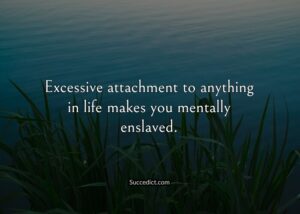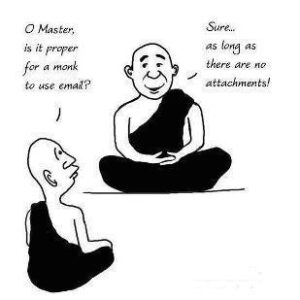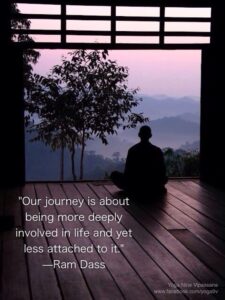
Not too long ago, I let go of the belief that I didn’t want to have kids. My perspective shifted, and I began to search for all of the reasons why bringing a life into the world may be something Joe and I should do. Slowly, I developed a deep desire to have a child. I wanted to support this new life and help them navigate this big, scary, beautiful world. I also felt motherhood would teach me many lessons I otherwise may not learn. So I “let go” of my identity as a wife without kids and embraced the possibility of becoming a mother. Well, it worked. I am pregnant.
Now, I am practicing letting go of all the things that come with pregnancy. This experience has opened new doors of opportunity to practice detaching myself from my attachments- like my current identity. My physical body is no longer just my own, and I have had to let go of treating it as such. I have also had to let go of all the unknowns that come with pregnancy and future mom life. These things include the potential for change in my current relationships, professional life, hobbies, lifestyle, free time, sleep schedule, finances, and responsibilities.
Then there are the endless questions that tend to pop up throughout the day. Should I be eating this? Who will take care of the baby? What if our kid is born with 15 toes? What if my friends don’t like my kid? How am I going to deal with a teenager? Does Joe actually know what we are getting ourselves into? Wait, should I be eating this?
And just when all of this mind chatter begins to drive me mad, I remind myself to focus on right now and let the rest of these hypothetical things go. I can then focus my attention on the miraculous experience of what is happening inside me rather than focus my energy and attention on my imaginary fears and speculated possibilities.
What Yoga Teaches Us About Letting Go
 The phrase “let go” sounds so pleasant and freeing yet can be one of the most challenging life practices. The yoga tradition teaches us how we can free ourselves from our attachments rather than hold on to things that bring us false pleasure and suffering. Although challenging, the practice of letting go is well worth it. According to my teacher Rod Stryker, applying dispassion, non-attachment, and surrender to our daily lives is a “prescription for worry-free living. One that can affect everything from the most practical and worldly aspects of your life to the most spiritual.”
The phrase “let go” sounds so pleasant and freeing yet can be one of the most challenging life practices. The yoga tradition teaches us how we can free ourselves from our attachments rather than hold on to things that bring us false pleasure and suffering. Although challenging, the practice of letting go is well worth it. According to my teacher Rod Stryker, applying dispassion, non-attachment, and surrender to our daily lives is a “prescription for worry-free living. One that can affect everything from the most practical and worldly aspects of your life to the most spiritual.”
This week we will discuss the third klesha- attachment. In the previous weeks, we discussed that ignorance is the root cause of all our suffering. We forget that things are continually changing and that nothing is permanent; we confuse the things that bring us real pleasure; and we don’t see life, people, or ourselves as they really are. Our confusion causes us to become attached to the idea of a life we think we should have. We attach ourselves to how we think others should behave and expectations for ourselves. Ignorance causes us to attach to our beliefs, desires, memories, political preferences, daily routines, identity, fears, anxieties, habits, and resentments- to name a few.
Attachment & Suffering
Suffering and attachment are directly correlated. We either suffer by attaching ourselves to a story about a circumstance. Or, we attach ourselves to desires that result in false pleasure. Let’s explore both of these concepts below.
Attaching To Our Stories
 It is essential to distinguish the difference between pain and suffering to clarify the meaning of attachment. Pain is simply a sensation in the body. Suffering arises from the stories and experiences that emerge out of what we call pain.
It is essential to distinguish the difference between pain and suffering to clarify the meaning of attachment. Pain is simply a sensation in the body. Suffering arises from the stories and experiences that emerge out of what we call pain.
If I apply for a job and don’t get it, I may feel disappointed (pain). The emotion of disappointment is simply a sensation within my physical body that can be processed and eventually disperses. Suffering results when I make that pain mean something, such as, “I am not good enough.”, “Those people don’t know what’s good for them.”, “I’ll never have what I want.” “I knew I should never have applied.”
Pain is a very normal part of the human experience. It is impossible to live life without experiencing challenges that result in pain; however, our pain becomes significantly intensified when we make pain mean something that isn’t true, and then we hold on to those stories.
Suffering ALWAYS arises when we think things should be different than they are. Let’s say the line at the post office is as long as those at an amusement park- which, by the way, is often the case at the post office in Palmer, Alaska. One person may wait patiently and accept they have to wait. Another person may throw an absolute fit the entire duration of their wait and question why in the world the line is so long. Both of these people experience the same circumstance. The only difference is that one accepts the situation, while the other attaches to the idea that the line should be shorter.
Yogic philosophy believes our circumstances are neutral. Our responses to our life circumstances -good, bad, and indifferent -have nothing to do with the conditions themselves and everything to do with our attachment or interpretation of those events. Yet we often think people, ourselves, and life should be different than they are.
Attachment & Desire
Attachment is seeking continual pleasure and will cause pain (2:7)
 Desire results when we experience some form of pleasure. When a sense object gives us a feeling of happiness, we develop a desire to experience this object again. Eating a plate full of pancakes creates a joyful experience for me. Later, when I recall eating these pancakes, a craving or desire will arise because of the pleasurable experience I had in the past with those buttery, syrup-drenched pancakes. The experience of happiness, pleasure, and joy is not a bad thing or a problem. It’s chasing after the satisfaction from our experiences that is the problem.
Desire results when we experience some form of pleasure. When a sense object gives us a feeling of happiness, we develop a desire to experience this object again. Eating a plate full of pancakes creates a joyful experience for me. Later, when I recall eating these pancakes, a craving or desire will arise because of the pleasurable experience I had in the past with those buttery, syrup-drenched pancakes. The experience of happiness, pleasure, and joy is not a bad thing or a problem. It’s chasing after the satisfaction from our experiences that is the problem.
There are two kinds of desires in life. One type of desire is constructive and brings us closer to who we wish to be. The other desire can be destructive and lead us further away from our desired results. The “right” desires are not always the obvious ones because these often come from the intellect. Your intellect is not always capable of knowing which desires best serve you. Let’s say I come home from a long work week and feel exhausted. My desire may be to find some source of instant pleasure to dilute my fatigue so I can feel better. So, I pour myself a drink and give my brain a nice hit of dopamine. I solved my desire to feel better with a short-term fix that temporarily resolved the issue. However, my actions’ long-term consequences include waking up feeling groggy, stressed, and still extremely tired.
In contrast, let’s take the exact same circumstance as above but pick a different action. I am tired from work, and I still desire to feel better (circumstance). Rather than pouring a drink, I allow myself to get in bed with a book and give my body/mind the rest it’s been asking for. Reading my book does not necessarily give my brain the same intense, instant hit of dopamine or pleasure as drinking would have- but instead, I wake up the next morning feeling refreshed, well-rested, and prepared to handle the next work week.
Believe it or not, our brains will often choose the things that give us short-term hits of pleasure over actions that will benefit our state of mind over the long run. The danger of this familiar cycle is we put ourselves at risk of becoming attached to desires- such as food, substances, procrastination, social media, technology, and negative thinking, which all have negative consequences rather than creating the desired results. Luckily, we can train our intellects to develop discriminative knowledge- or the ability to discern between the actions that lead to desired results versus those that leave us stuck in the same old cycle of suffering.
How To Detach From Attachments
1. Change Your Perceptions
We can detach ourselves from wanting things to be different than they are by changing our perception. More often than not, things don’t work out how we want them to. It is challenging to understand why these things happen in the moment; however, we can reflect on a challenging circumstance and see how it benefited our future. For example, completing graduate school may have been one of my most challenging endeavors. Academically it was extremely difficult. What was even more challenging was surviving the brutality from some of my professors and fellow classmates (I am still practicing letting these things go.). At the time, it was hard to see what the point of all of this was. Now I can look back and realize this experience made me more resilient, self-confident, and better equipped to handle challenging situations outside of grad school.
Today I know discomfort is just another opportunity to learn something. I have become better at catching myself when I start to push uncomfortable circumstances away or change them. Instead of resisting discomfort, I question what it might teach me. This shift in perspective automatically allows me to detach myself from wanting things to be different and instead accept things as they are.
I was very resistant to accepting that my energy levels were at an all-time low during my first trimester. I began to judge myself for not being more productive rather than allow myself to rest. As you can imagine, I was beating myself up. So much so that I finally decided to change my perspective. I was growing a baby. Of course, I was tired and needed to rest. Sleep was not a bad thing. It was a necessary part of the process and one I should take advantage of while I could. Now, there are some nights I unapologetically and willingly go to bed at 7 pm.
2. Reflect On What You Truly Desire
Many of our long-term desires are often compromised by our attachments to short-term pleasure. We have access to many forms of false pleasure in our daily environment. We tend to confuse these forms of pleasure with those that ultimately bring us happiness. One way to ensure we choose the right forms of pleasure is to identify what we truly desire.
A powerful tool to help you achieve success is to identify ‘why’ you hope to achieve something. The secret to creating a powerful ‘why’ is it must be compelling enough to override any negative emotion and generate a feeling of resolve no matter what obstacles you face. Your desire is the thought you grab onto when you feel you may give up or reach for a quick fix rather than do the work. My ‘why’ for exercising has significantly changed now that I am pregnant. I used to exercise to stay in shape so that I could keep up with my husband and friends. Now, my ‘why’ for exercising is the many health benefits it has for the baby. I also want to get in shape to have a baby. Many days I would much rather sit on the couch and eat pancakes rather than move my body. Whenever I resist exercising, I just remind myself of my why, which generates enough resolve to get me up and moving.
 And Now, Let Go
And Now, Let Go
The secret to living a joyful, fulfilled life has nothing to do with circumstances or material wealth. Instead, it has everything to do with surrender or non-attachment. Can you imagine for a moment what life would be like if we freed ourselves from all attachments? For many of us, our life would look completely different, and in a good way. I challenge you to practice letting go of this klesha of attachment, which will create more peace, happiness, and clarity in your life. Feel free to use the below contemplation points to help you let go.
Contemplation Points
- What things are you the most attached to in your life? Do these things cause you to suffer (i.e., experience worry, anxiety, anger, resentment, greed)?
- How can you let go of a non-constructive perspective for a different one that can benefit you? How may your challenges benefit your future?
- What are some things you wish were different than how they are (relationships, jobs, qualities about yourself, etc.).? How can you accept them as they are?
- What do you most desire from this life? Can you think of 5 things you do every day to support this desire? Can you think of 5 things you do every day that brings you further away from this desire?







